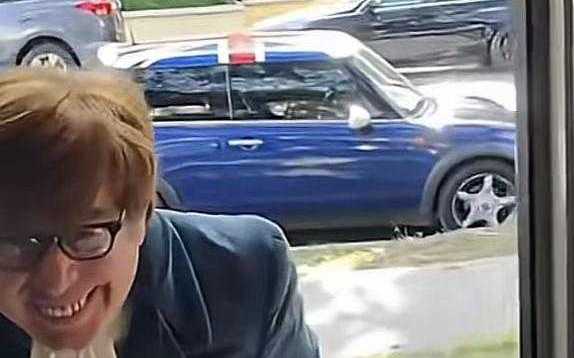Movies are all about magic. They tell stories that amplify and elaborate on the mundane bits of everyday life—leaving viewers questioning if things they see on the big screen are really real, or just portrayed that way.
For non-Americans enjoying American films, the movies can give them some pretty whacky ideas about what American culture is really like. But sometimes, how America is portrayed in the movies is actually spot-on.
People on Reddit discussed the things they've seen in American movies that actually are legitimate. From diners to the 'burbs to Greek life and more, these are 28 things that really exist in America—and not just the movies.
- YouTube www.youtube.com
People
"Cowboys. I mean I knew they were real and that some people dressed like the Hollywood version of cowboys but I did not realize it was still a present day job and that people still dress that way to do it." - Cougarette99
"Firefighters coming to help bring down a cat from a tree. I was visiting relatives one summer and one of the house cats climbed a tree and wouldn't come down. I came up with the idea of calling the fire department, thinking they'd laugh me off and hang up, but sure enough, they came with a truck, ladders, gear, everything, and helped bring the cat down successfully." - mrcmnt
"Baggers in the grocery store. And door greeters in completely normal supermarkets." - interesseret
"'More coffee, hon?' On a visit to the US, driving through Nevada or Utah we stopped at a diner and as we were entering I joked around saying something like 'if the waitress is wearing an apron and calls me honey I'll lose my sh*t'. Was. Not. Disappointed." - Jaimebgdb, Urik88
Places
"The way suburbia looks. I'm American and sent a picture of the street my home is on to a German friend and he was like 'it looks like a movie set'." - NewAnything8221
"Waiting all day in the DMV. Even when I had to do car stuff in the person, I was never anywhere for an entire day sorting it out." - ocelotrevs
"Going into a bar for a drink, and sitting at the bar, by yourself. Chatting to the bartender. Chatting to the random person next to you. I always thought that was something put in TV shows just so they could make up a reason for someone to chat to the bartender, or pour out their woes, or whatever. People don't sit by themselves at the bar anywhere else. I tried it in Australia and got weird looks." - the_rain_keeps_comin
"Diners and breakfast tradition? Don't know if I should call it like that but I would see in movies how diners would be a tradition to go at breakfast and it's really like that, those diners are busy!!" - ainacct
- YouTube www.youtube.com
Things
"The over-the-top Halloween parties where everyone took a large amount of effort to dress up. Yep that is accurate." - dion_o
"The length of a CVS receipt." - OptimistPrime527
"The insane medical advertisements with a million side effects said in rapid fire at the end. We visited my husband bestie in 2019, when we were watching something on tv while eating dinner we saw our first one. Genuinely turned to him like ‘that’s satire, right?’" - Myhandsarecold11
"Red Solo Cups. I thought they were just a Hollywood prop used to hide alcohol brands or signify 'party scene.' I went to a college party in Ohio and they were literally everywhere. I was shook." - Unlikely_Praline9442
Schools
"The fraternity/sorority scene in college. I was an international student at UT Austin and it was a crazy realization that the movie depictions of college life is actually underwhelming. I witnessed shit that could not be legally portrayed in movies. You people are crazy." - lucas14qr
"The yellow school buses that have a flip out stop sign." - MudMonyet22
"Prom culture. The king/queen stuff." - kyubeyt
"lol I’m American from the CA coast and while we had high school football, I thought that it being a huge deal was only in movies/tv. Then I moved to Georgia and later Texas. Hahaha omg. Wow. I was wrong lol." - TakeMeBackToCA831
@iamsoldanaThe school system in the USA really is like the movies🏈📚🎓🎥🎬🍿 #usa #america #highschool #americaninparis #americanhighschool #americancollege #americanculture
Food
"I am an American who lived overseas for many years, and had many friends on social media when I returned home. I posted a photo of Chinese food takeout in those white square boxes and had dozens of my friends from overseas react in surprise- they thought it was only something they did in movies." - Kateseesu
"'Have a nice day' everywhere all the time and blueberry muffins." - AlfredLuan
"The free refill at restaurants." - craftlover221b
New York City
"All the smoke/steam coming out the vents on the road in New York in the movies." - curious__curiosity
"I got off a bus in New York and a newspaper blew past me. I could imagine the camera panning up from my shoes..." - JunkoKumaki
"I got off a bus in New York and a dude came up to me, opened his jacket, and tried to sell me one of many 'Rolexes' he had hanging inside his coat. I legit thought that was strictly a movie thing, and I'm American!" - Ataru13
"And constant police/ambulance sounds. I thought it's bullshit until I came to live here. Now my daughters say the street noise is calming :)." - romario77
"Manhattan. I remember my first trip and was like 'Oh my God this is all fucking real'." - fenton7
Nature
"Fireflies are pretty wild, you sure do just have swarms of glowing bugs." - WehingSounds
"Tumbleweeds. I was actually flabbergasted when I went to visit the US and people were casually talking about tumbleweeds. I thought they were just a thing in cartoons." - PlanetoidVesta
"I'm an American, an Alabamian. I made friends with a guy at work who is Russian. He was new to the country, so we'd invite him to come over and eat with us all the time. One summer afternoon, we were sitting on our back deck drinking beer and a hummingbird whizzed past his ear. Alex totally freaked out. I had to point out our hummingbird feeder to him. He sat there the entire day just mesmerized by the things. They really are magical when you stop to think about them." - AnybodySeeMyKeys
"Skunks! I genuinely thought they were a mythical creature of cartoon origins. Why? I don’t know. I guess I thought they were implausible, like unicorns. They don’t exist in Europe, so I only knew of them from cartoons, and from sitcom jokes. I made assumptions about their existence that went unchallenged until I was 27." - difractional







 A woman is getting angry at her coworker.via
A woman is getting angry at her coworker.via  A man with tape over his mouth.via
A man with tape over his mouth.via  A husband is angry with his wife. via
A husband is angry with his wife. via 
 Austin Powers impersonator arrives at Chase Hofer's apartment.Photo Credit: Kenneth Webb, TikTok
Austin Powers impersonator arrives at Chase Hofer's apartment.Photo Credit: Kenneth Webb, TikTok
 Mom hugging crying daughter
Mom hugging crying daughter Dad kissing child on cheek
Dad kissing child on cheek Mom comforting daughter
Mom comforting daughter

 A blue light painting of an infinity symbol. Photo by
A blue light painting of an infinity symbol. Photo by